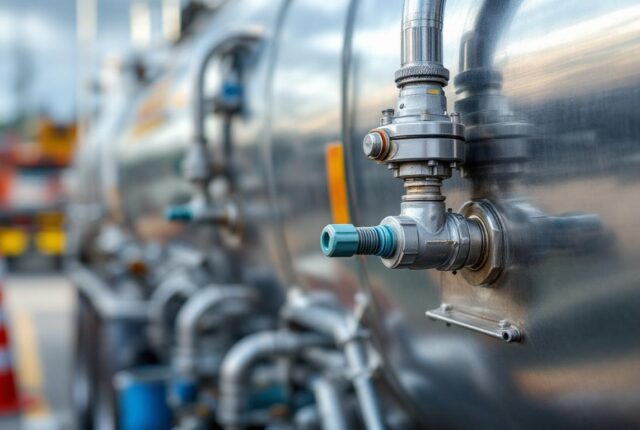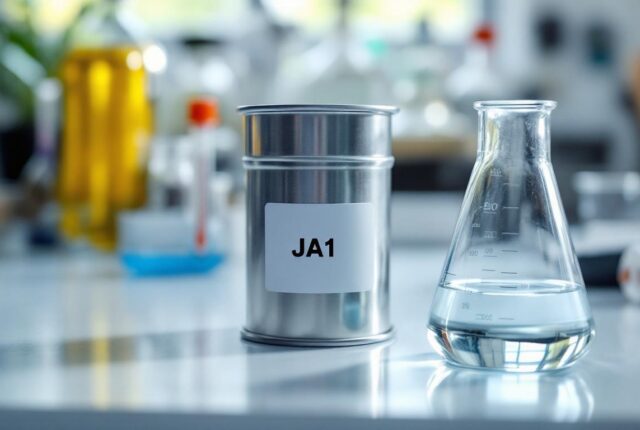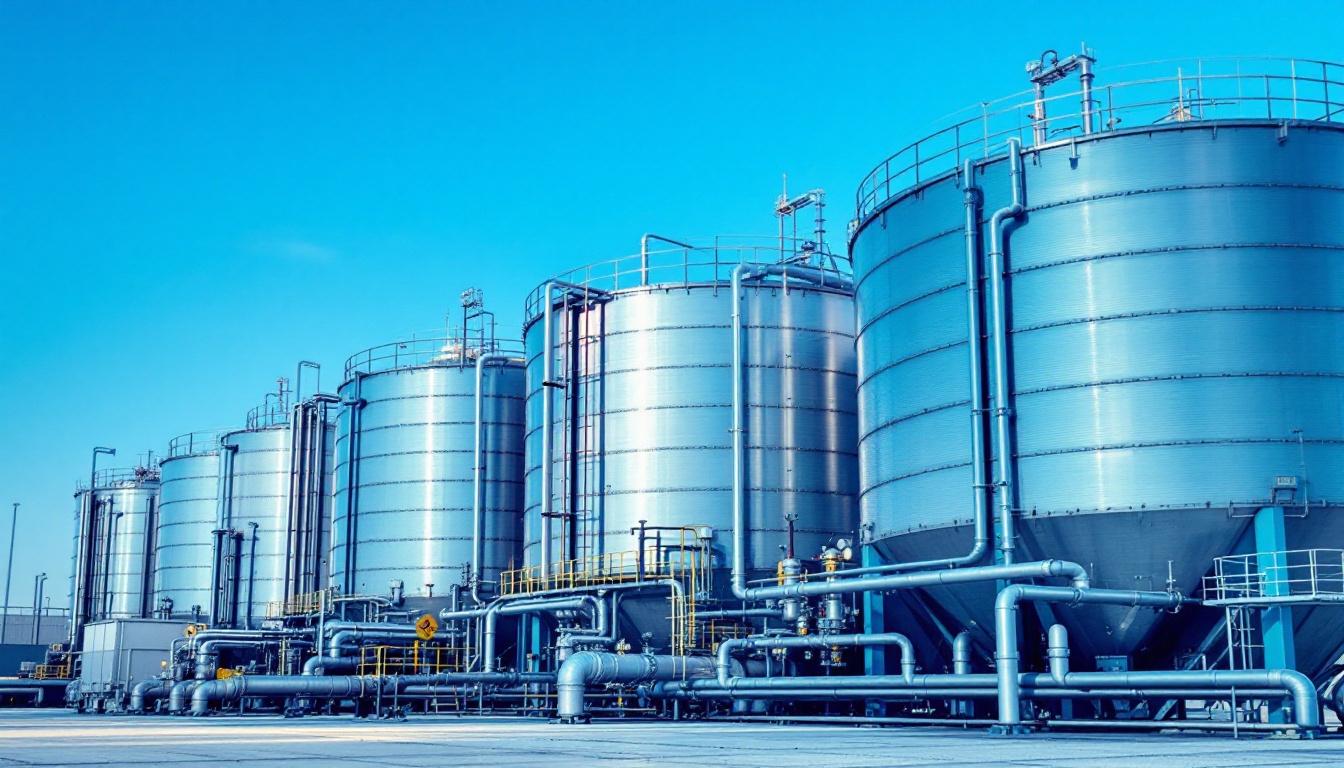
Fuel Storage in Rotterdam
Rotterdam, Europe’s largest port, stands as a cornerstone for fuel storage and distribution. At GLOBAL TERMINAL NETHERLANDS B.V, we recognize the critical role this bustling hub plays in the energy sector.
With its strategic location and advanced infrastructure, Rotterdam excels in handling various fuel types, including jet fuel storage. This blog post explores the city’s fuel storage capabilities, safety measures, and future prospects in this vital industry.
Why Rotterdam Dominates Fuel Storage
Rotterdam’s dominance in fuel storage stems from its unparalleled position as Europe’s largest port. This strategic location offers unmatched accessibility to major European markets, making it a pivotal hub for energy distribution.
Unrivaled Connectivity
The port’s extensive network of pipelines, railways, and inland waterways provides seamless connectivity to key industrial centers across Europe. This infrastructure allows for efficient fuel transportation to countries like Germany, Belgium, and France within hours. Making renewable fuels more competitive for inland shipping requires both price incentives and a mandatory CO₂ reduction for fuels.
State-of-the-Art Facilities
Rotterdam boasts cutting-edge fuel handling facilities that set industry standards. The port’s advanced infrastructure includes specialized terminals equipped with high-speed pumps and automated systems for rapid loading and unloading. These facilities accommodate various fuel types, from conventional petroleum products to emerging biofuels. Liquid fuels generate the highest pollution levels compared to other fuel types.
Massive Capacity
The port’s expansive area of over 12,500 hectares provides ample room for future development. This space allows for the construction of new storage tanks and the expansion of existing facilities to meet growing demand. In 2022, the port reported a total liquid bulk throughput of 202.4 million tonnes, showcasing its massive capacity for fuel storage and handling.
Environmental Commitment
Rotterdam’s port authorities have implemented strict environmental regulations to minimize the impact of fuel storage and handling operations. Advanced leak detection systems, vapor recovery units, and stringent emission controls are standard practices across the port’s facilities. This commitment to sustainability aligns with global efforts to reduce the environmental footprint of the energy sector.
Strategic Partnerships
The port fosters collaborations between storage providers, logistics companies, and energy firms to create an integrated ecosystem for fuel management. These partnerships (often spanning decades) have resulted in optimized supply chains, reduced costs, and improved efficiency in fuel distribution across Europe.
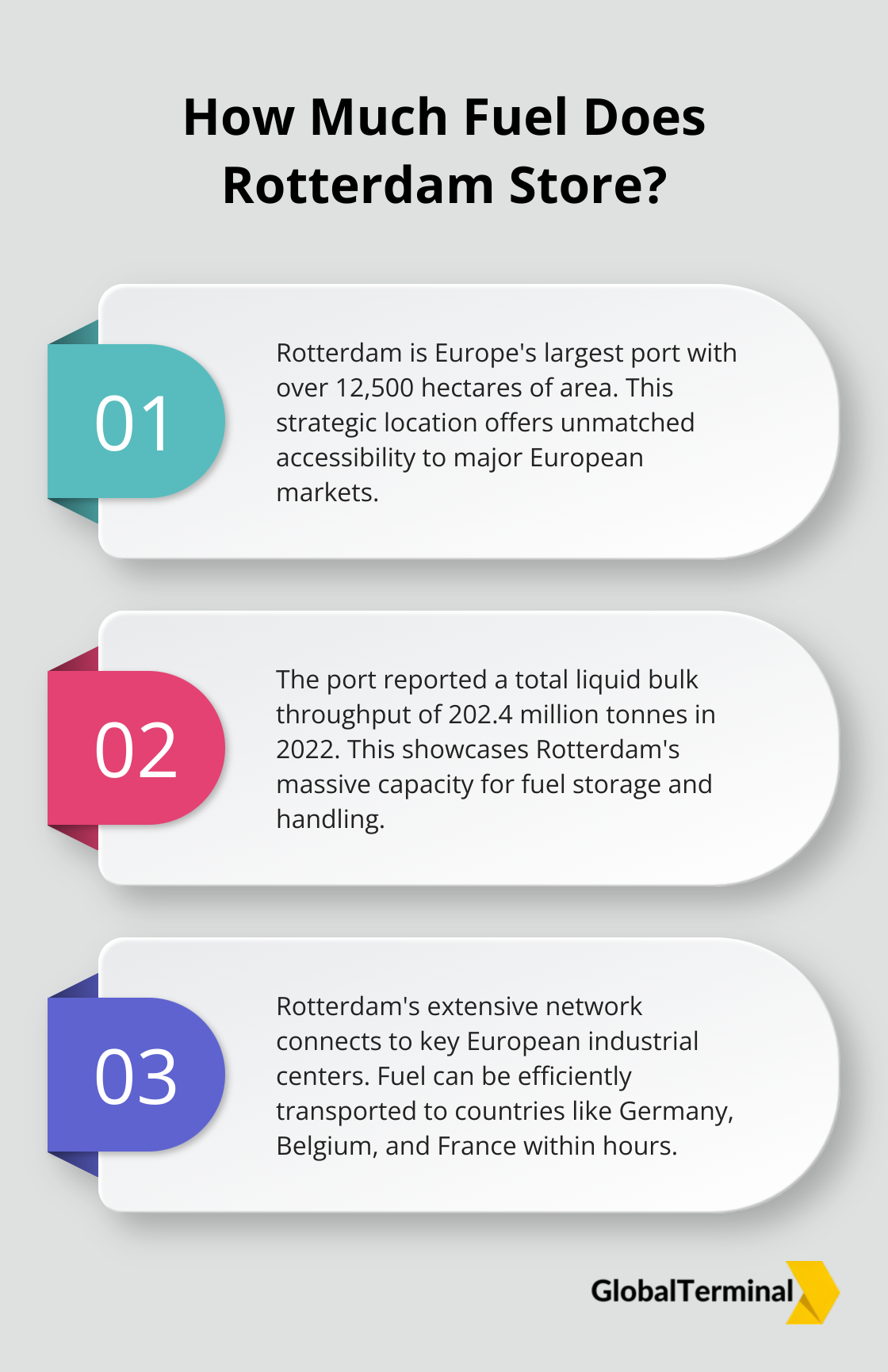
As we move forward, it’s essential to understand the specific types of fuel storage solutions available in Rotterdam, each designed to meet unique industry requirements and safety standards.
Diverse Fuel Storage Solutions in Rotterdam
Rotterdam’s port offers a wide array of fuel storage solutions, each designed to meet specific industry needs and safety standards. The port’s versatility and specialization in fuel storage make it a hub for various fuel types, from conventional petroleum products to emerging biofuels.
Underground Storage Tanks
Underground storage tanks (USTs) are used in Rotterdam for holding cargo residues, sometimes mixed with water, or harmful, combustible, or other dangerous liquids (slops). These tanks offer several advantages:
- Protection from external elements
- Efficient land use
- Advanced leak detection systems
- Corrosion protection
Above-Ground Storage Tanks
Above-ground storage tanks (ASTs) are widely used in Rotterdam, Europe’s biggest bunkering port. Key features of ASTs include:
- Various sizes
- Flexibility in maintenance and inspection
- Preferred choice for many operators
In the Netherlands, strategic storage is largely in above-ground tanks, highlighting their significance in the port’s infrastructure.
Floating Roof Tanks
Floating roof tanks serve a specific purpose in storing volatile petroleum products. These tanks feature a roof that floats on the surface of the stored liquid, which:
- Minimizes vapor space
- Reduces emissions
Rotterdam extensively uses floating roof tanks for storing crude oil and gasoline.
Specialized Storage Facilities
Rotterdam caters to a wide range of fuel types with specialized storage facilities. Notable examples include:
- LNG (Liquefied Natural Gas) storage
- Jet fuel storage: Dedicated tanks with specialized filtration systems ensure fuel purity
The choice of storage solution depends on various factors, including fuel type, storage duration, and operational requirements. As the energy landscape evolves, Rotterdam actively invests in infrastructure to support the storage of sustainable fuels. Plans for dedicated storage facilities for hydrogen and other low-carbon fuels position Rotterdam at the forefront of the energy transition.
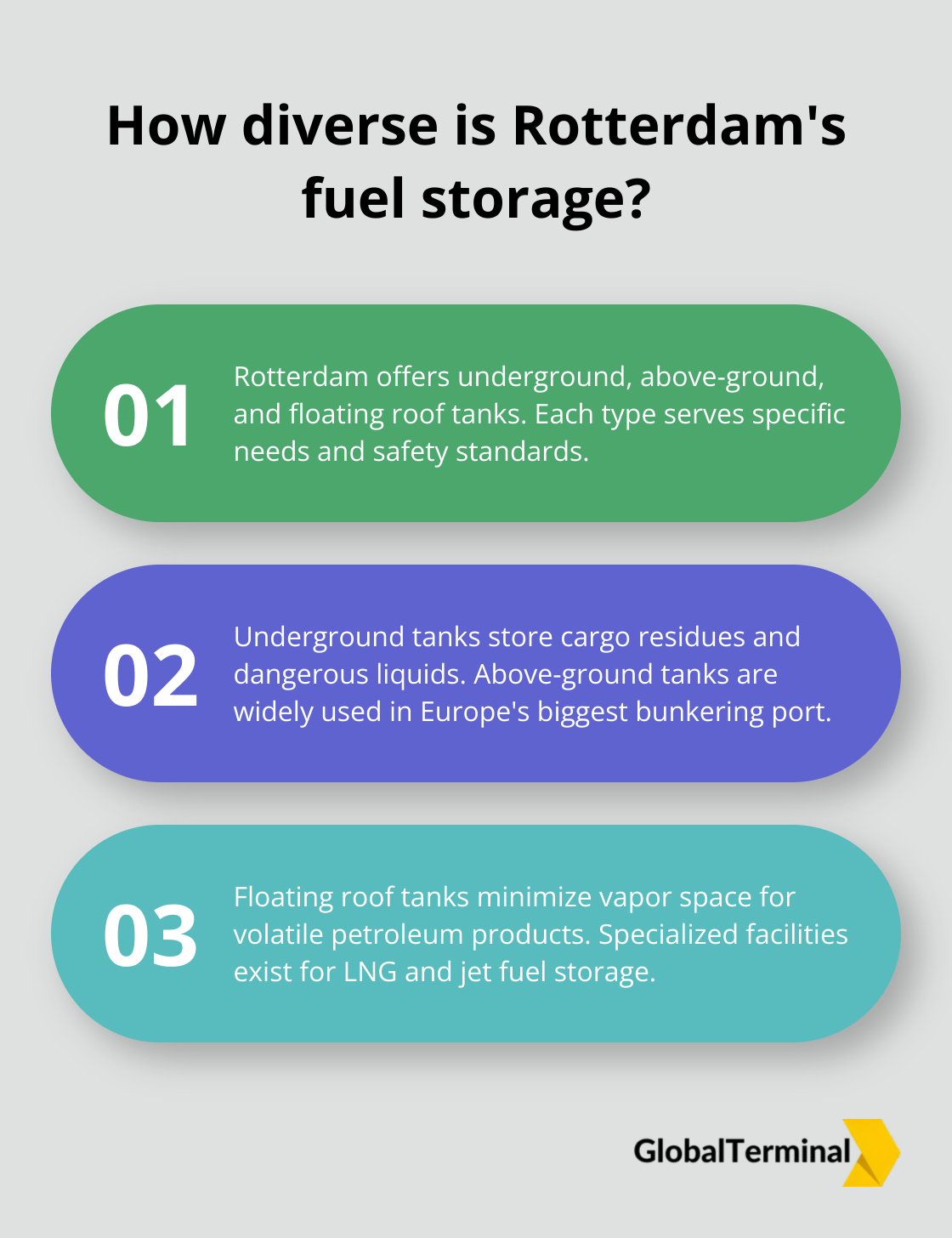
With such a diverse range of storage solutions available, safety and environmental considerations become paramount in Rotterdam’s fuel storage operations. The next section will explore the stringent measures and protocols in place to ensure the safe and responsible handling of fuels in this bustling port.
Safeguarding Fuel Storage in Rotterdam
Rotterdam’s port authorities have implemented some of the world’s most stringent regulations for fuel storage, setting a global benchmark for safety and environmental stewardship. This chapter explores the advanced safety measures and environmental protection strategies employed in Rotterdam’s fuel storage operations.
Cutting-Edge Leak Detection Systems
Rotterdam’s fuel storage facilities utilize advanced leak detection technologies. Storage tanks are equipped with automatic tank gauge (ATG) systems that can detect leaks through highly accurate inventory measurements combined with the tracking of delivery and dispensing. This rapid response capability significantly reduces the risk of environmental contamination and product loss.
Robust Environmental Impact Mitigation
To minimize environmental footprint, Rotterdam’s storage facilities have implemented comprehensive vapor recovery systems. This technology captures and recycles volatile organic compounds (VOCs) that would otherwise be released into the atmosphere.
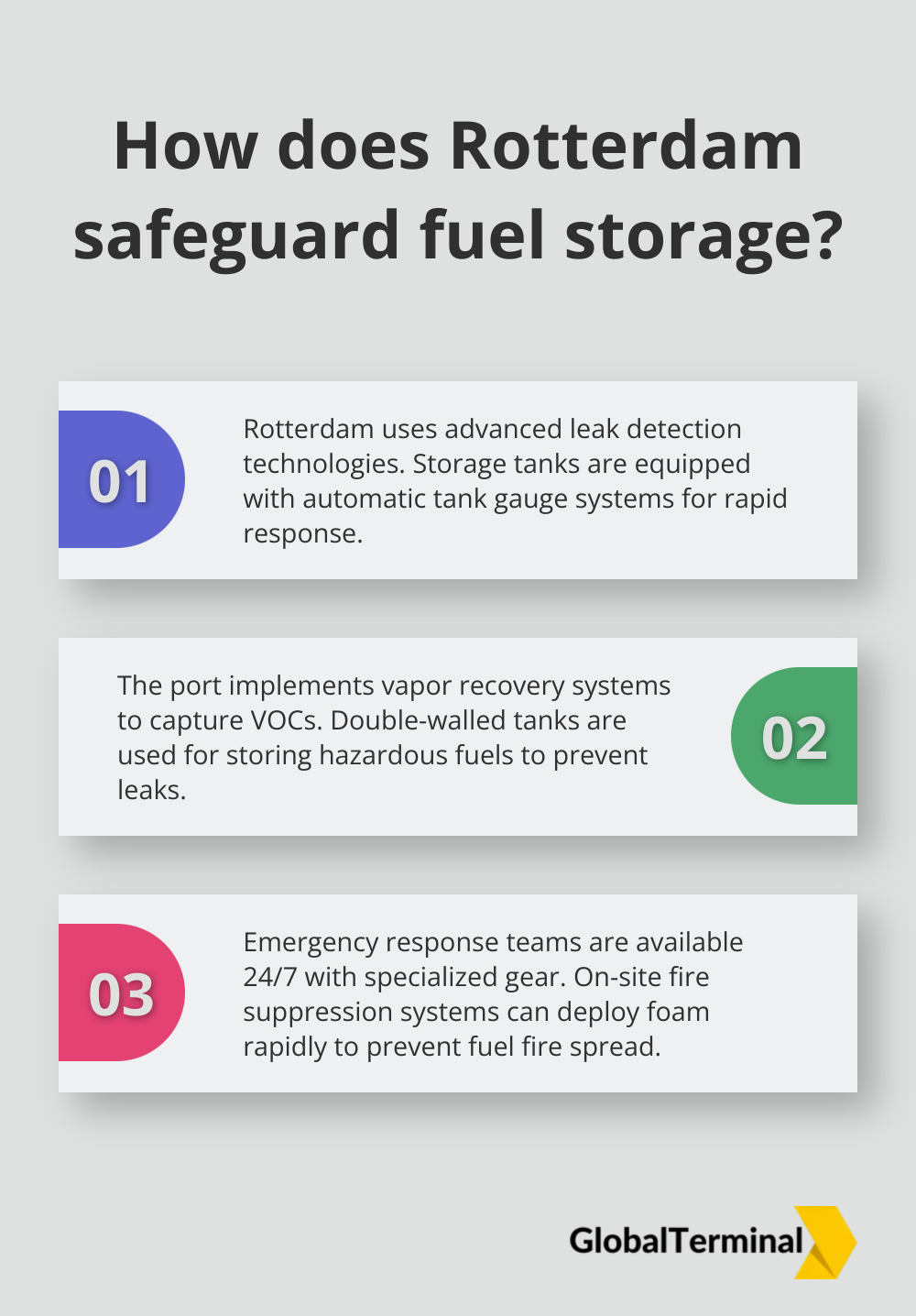
The port has also pioneered the use of double-walled tanks for storing particularly hazardous fuels. This design provides an extra layer of protection against leaks and significantly reduces the risk of soil and groundwater contamination.
Proactive Emergency Response
Emergency response protocols in Rotterdam are designed for swift and effective action. Regular drills simulate various emergency scenarios, ensuring teams are always prepared. On-site fire suppression systems can deploy foam rapidly, which is crucial in preventing the spread of fuel fires.
Dedicated emergency response teams are on call 24/7. These teams can mobilize quickly, equipped with specialized gear for handling fuel-related emergencies.
Integrated Emergency Management
Rotterdam has developed an integrated emergency management system in collaboration with local authorities. This system allows for seamless coordination between storage facilities and external emergency services, enhancing overall response capabilities.
Continuous Improvement and Innovation
Rotterdam’s fuel storage sector continuously invests in research and development to improve safety and environmental protection. This commitment to innovation has led to the adoption of new technologies such as:
- AI-powered monitoring systems
- Drone-based inspections
- Advanced corrosion prevention techniques
These rigorous safety and environmental standards ensure that fuel storage in Rotterdam remains secure, efficient, and environmentally responsible. Seagoing Vessels that score 31.0 points or more on the Environmental Ship Index (ESI), as administrated by the International Association of Ports and Harbors, are recognized for their environmental performance. Global Terminal Netherlands B.V., among other providers, adheres to these high standards, offering premier fuel storage solutions in this strategic port.
Final Thoughts
Rotterdam’s unparalleled fuel storage capabilities position it as a cornerstone of Europe’s energy infrastructure. The port’s strategic location, advanced facilities, and commitment to safety and sustainability set global standards for fuel handling and distribution. Rotterdam’s diverse range of storage solutions, including specialized facilities for jet fuel storage, caters to the evolving needs of the energy sector.

Rotterdam will play a pivotal role in the energy transition with ongoing investments in infrastructure for sustainable fuels. This forward-thinking approach ensures Rotterdam will remain at the forefront of fuel storage and distribution for decades to come. As the industry evolves, companies need a partner with state-of-the-art facilities and a deep understanding of regulatory compliance, safety protocols, and environmental stewardship.
GLOBAL TERMINAL NETHERLANDS B.V stands out as a premier provider of fuel storage and logistics solutions in Rotterdam and other strategic global ports. With cutting-edge facilities (including those for jet fuel storage in Rotterdam), robust safety measures, and a commitment to operational excellence, they offer tailored storage solutions that meet diverse operational needs. The future of fuel storage in Rotterdam looks bright, driven by innovation, sustainability, and strategic partnerships.

